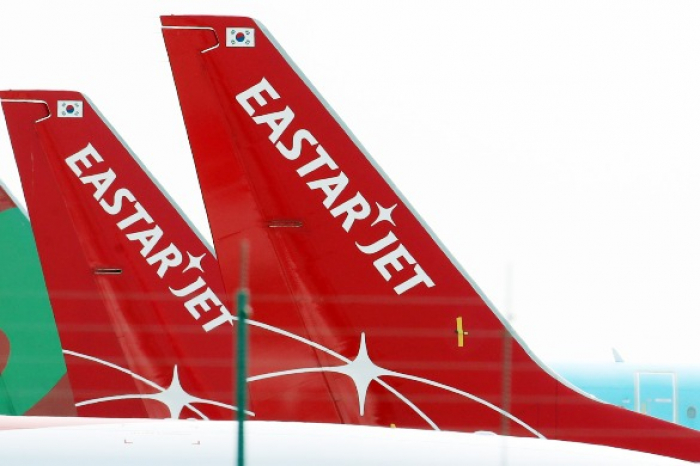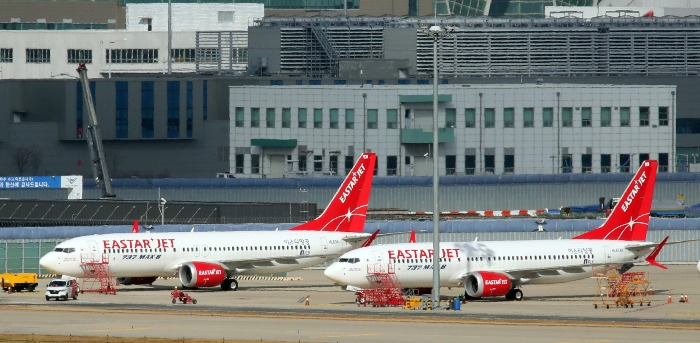Eastar Jet to add 7 airplanes with aim to rake in $111.2 mn in 2023 sales
The South Korean budget airline will resume domestic flights in March and international flights in H2
By Mar 14, 2023 (Gmt+09:00)
S.Korea's LS Materials set to boost earnings ahead of IPO process


NPS to commit $1.1 billion to external managers in 2024


Samsung Heavy Industries succeeds autonomous vessel navigation


Samsung shifts to emergency mode with 6-day work week for executives


Korean battery maker SK On expects business turnaround in H2



Eastar Jet Co., a South Korean low-cost airline, will expand its fleet to 10 aircraft this year to resume flight services at home and abroad about three years after its operation suspension and aims to earn 146 billion won ($111.2 million) in sales, its new chief executive officer announced on Tuesday.
According to a five-year business plan unveiled by Eastar Jet President and CEO Cho Joong-seok on the same day, the Korean budget airline will add seven new airplanes to its current fleet of three aircraft to resume domestic flights on the Gimpo-Jeju route on 26 March and international flights on the Gimpo-Songshan, Taiwan route in the second half of this year.
The new fleet will include three Boeing 737-8 planes, which are newer than its current 737-800 aircraft. The company will lease all the seven new airplanes, and it has enough money for that, Cho said, dispelling concerns about the low-cost carrierŌĆÖs financial strain.
ŌĆ£I expect the airline will turn around in the third quarter of next year,ŌĆØ said Cho.
The budget carrier has set a target to earn 146 billion won in sales this year and return to operating profit next year under a longer-term plan to achieve 800 billion won in sales in 2027.
Eastar Jet was in complete capital erosion as of end-2021, according to financial statements filed with KoreaŌĆÖs Financial Supervisory Service last May.
But homegrown private equity firm VIG Partners in January acquired a full stake in Eastar Jet for 35 billion won and improved the air carrierŌĆÖs financial soundness after raising 110 billion won from a new share sale. Eastar JetŌĆÖs debt ratio is estimated to have fallen to 150%.┬Ā
NEW BEGINNING FOR ANOTHER LEAP
The Korean LCC began to fly passengers between KoreaŌĆÖs Gimpo airport and the nationŌĆÖs popular resort island Jeju Island in January 2009 and launched international flight services in December of that year. But it had to suspend its flight operations in 2020 due to deteriorating financial conditions.

KoreaŌĆÖs No. 1 LCC Jeju Air Co. agreed to buy it in that year but later called off the acquisition plan amid growing financial uncertainties from the COVID-19 pandemic.
The air carrier has finally received an Air Operator Certificate (AOC) from the Ministry of Land, Infrastructure and Transport in February, allowing it to resume its flight operations. It graduated from court receivership in March of last year.
After three ownership changes in three years, the company is gearing up for a new start.
Its founder and former lawmaker Lee Sang-jik is in jail after he was sentenced to six years in prison for embezzlement of company funds and breach of trust in January last year. The company was also embroiled in an illegal recruitment scandal late last year.
ŌĆ£Eastar Jet has started anew after severing ties with the past,ŌĆØ said Cho, adding that the current management is different from the former team that was involved in the carrierŌĆÖs illegal hiring.
It will review whether to expand international flight services to other Southeast Asian countries such as Vietnam and Thailand as well as Japan later.
ŌĆ£The company will add new routes with high demand depending on the trend,ŌĆØ said Cho.
To meet its ambitious goal for a new start, the budget carrier will hire 200 workers this year.
It will also invest 20 billion won in the purchase of spare engines and other aircraft parts and staff training this year. It has already spent more than 9 billion won to enhance the safety of its flight operations.
Write to Seo-Woo Jang at suwu@hankyung.com
Sookyung Seo edited this article.
-
 AirlinesEastarJet to resume flights after three years of suspension
AirlinesEastarJet to resume flights after three years of suspensionMar 02, 2023 (Gmt+09:00)
1 Min read -
 AirlinesPE firm VIG Partners takes over Korean low-cost carrier Eastar
AirlinesPE firm VIG Partners takes over Korean low-cost carrier EastarJan 06, 2023 (Gmt+09:00)
2 Min read -
 Mergers & AcquisitionsSBW emerges as sole bidder for Eastar Jet acquisition
Mergers & AcquisitionsSBW emerges as sole bidder for Eastar Jet acquisitionJun 14, 2021 (Gmt+09:00)
2 Min read


